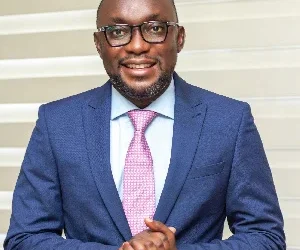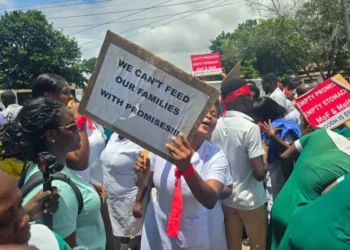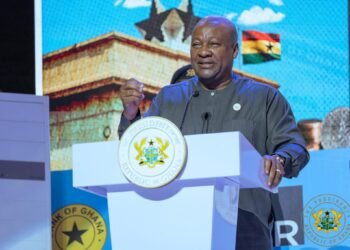Ghana’s Minister for Health, Kwabena Mintah-Akandoh, has reiterated the government’s unwavering commitment to strengthening the country’s healthcare infrastructure, pledging that no community will be left behind in the national quest for accessible and quality healthcare.
Speaking at the Government Accountability Series, the Minister provided an in-depth overview of progress made in health infrastructure over the past six months, emphasising the importance of physical facilities and essential equipment in the delivery of lifesaving care.
The Minister emphasised that the government’s decision to continue ongoing projects was rooted in a policy of continuity and pragmatism.
“In line with the government’s promise to continue the ongoing health projects, we have taken deliberate steps to move these facilities toward completion. Our government’s resolve is clear: to leave no community behind in its journey to excellent health infrastructure.
“We inherited several critical infrastructure projects, including the treatment and holding centres at Koforidua, Goaso, Sefwi Asawinso and infectious disease training centres at Pantang and Nkekenso.”
Ghana’s Minister for Health, Kwabena Mintah-Akandoh
In addition, 10 key rehabilitation projects—including the renovation of Effie-Nkwanta Hospital, La General Hospital, Komfo Anokye Teaching Hospital, and the reconstruction of the Central Medical Stores—were among the assets needing urgent attention.
Highlighting specific achievements, the Minister announced that four major COVID-19 response initiatives, including treatment centres and staff accommodation funded by both the Government of Ghana and the World Bank, have been completed across the country within the last six months.

These facilities, he noted, form part of the broader emergency health preparedness agenda and have strengthened the nation’s capacity to respond to future outbreaks.
70% of Agenda 111 Targeted
Touching on the widely discussed Agenda 111 initiative, Hon. Akandoh said the government had taken a strategic decision to prioritise projects that were already over 70% complete.
“We have focused our efforts on completing these projects because they are close to delivering benefits to communities,” he explained. This pragmatic approach, he indicated, ensures that investments yield tangible results quickly and sustainably.
The Minister further revealed that major hospitals across the country have also seen significant improvements in infrastructure and equipment. The Komfo Anokye Teaching Hospital’s Maternity and Children’s Block, for example, is undergoing targeted upgrades.
According to him, other facilities such as the Korle-Bu Teaching Hospital, Cape Coast Teaching Hospital, and the Lekma Hospital have received critical medical equipment, including ventilators and oxygen plants. “These are the tools we need to save lives every day,” he noted.
Despite these strides, the Minister admitted that challenges remain, as many health facilities across the country, especially those in underserved areas, still require significant upgrades, ranging from structural renovations to equipment procurement and improved maintenance systems.

“Many facilities need renovations, new equipment, and a dependable maintenance system. We commit to bridging these gaps through domestic investment and international partnerships—primarily through private partnerships.”
Ghana’s Minister for Health, Kwabena Mintah-Akandoh
Grassroots Approach to Healthcare Expansion
Demonstrating the government’s grassroots approach to healthcare expansion, Hon. Akandoh announced that funding has been released to every district assembly across the country to support the construction of at least two new Community-based Health Planning and Services (CHPS) compounds each year.
“This investment brings quality health services closer to communities. It shows our government’s dedication to building a stronger, healthier Ghana from the ground.”
Ghana’s Minister for Health, Kwabena Mintah-Akandoh
He emphasised that the expansion and strengthening of CHPS compounds are not merely symbolic. Rather, they are crucial components in improving access to care, especially in rural areas where long distances to health facilities often deter people from seeking timely medical attention.
As part of the broader healthcare network in Ghana, the Minister provided a snapshot of the public sector infrastructure.
“Across the country, within the public sector, we have six teaching hospitals, ten regional hospitals, and over 9,025 primary healthcare facilities, including district hospitals, polyclinics, health centres, and CHPS compounds”.
Ghana’s Minister for Health, Kwabena Mintah-Akandoh
He also noted the considerable number of private healthcare facilities operating across Ghana, highlighting the complementary role they play in national healthcare delivery.
“These form the network of facilities through which we provide health care to the people of Ghana,” Hon. Akandoh added, underscoring the collective importance of both public and private institutions in sustaining health outcomes.

In concluding his remarks, the Health Minister expressed confidence in the government’s direction, urging Ghanaians to continue supporting efforts to build a resilient health system.
He stated that through strategic investments in infrastructure, workforce development, equipment upgrades, and private sector partnerships, the vision of equitable, accessible, and quality healthcare is well within reach.
The address by Hon. Kwabena Mintah-Akandoh reaffirms government’s commitment to transparency and results, particularly in the health sector where lives depend on timely delivery, reliable infrastructure, and sustained political will.
READ ALSO: Lands Minister Unveils Five-Pillar Strategy to Combat Illegal Mining























